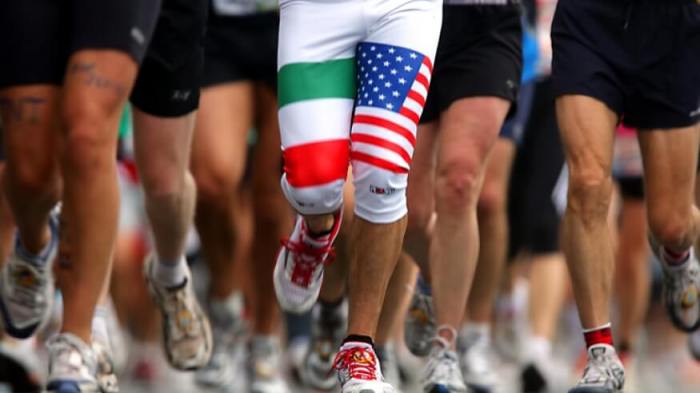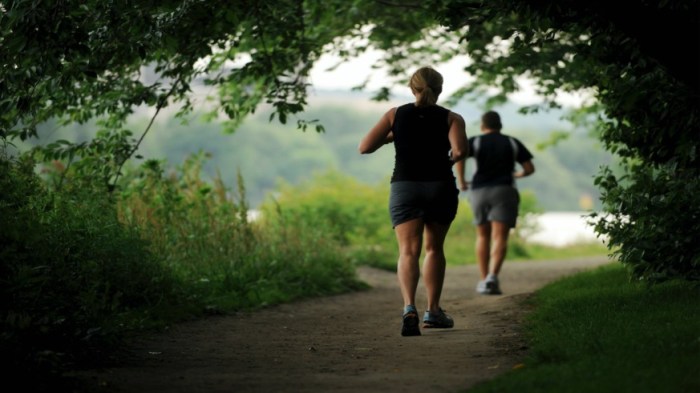If you’re running the Boston Marathon, your months of training are about to come to a close. But there’s still a lot to know and prepare for in the days before the big race. If this is your first foray into running 26.2 miles, you might also want to know what to expect after you cross that finish line and your body starts to recover.
To get the scoop on what you can do to make sure your body handles the marathon as best as it can, Metro spoke with Dr. Doug Comeau, medical director of Boston University Sports Medicine and a physician at Boston Medical Center. Comeau will also be in the medical tent at the Boston Marathon finish line this year, his 13th time volunteering on race day.
What are the most common injuries for marathon runners?
For the inexperienced marathon runner or a first timer, we see [injuries] in the buildup of their mileage. As they increase their mileage, they have IT band pain closer to their knee, compared to their hip, and also patellofemoral pain syndrome in the kneecap. After their long run, a lot of people have knee pain, hip pain, ankle pain, and typically we say definitely still run, but cross train and taper down your miles because your body is getting used to the metabolic equivalent of getting up to the race itself.
Training goes on for months, but what’s important to do right before the race to prevent injury?
The first one is you want to know what the weather forecast is, that’s one of our biggest things.
If you are the recreational runner who’s going to finish in a 4, 5, 6 hour time period, that’s when — particularly in Boston — you may actually have different temperature changes [throughout the day]. There’s rain in the forecast right now, so you want to try to dress warmly and dry, but not too warmly because if you wear compression you could overheat.
Before the race: eating lots of good carbs so that you can actually have the fuel beforehand, and on race day, making sure you refuel during the race with an energy bar, sugary snacks. Also, making sure you keep hydrated and alternate water versus carbo loaded drinks like Gatorade. If you drink too much plain water, it could lead to hyponatremia, which means low sodium.
What do you often see in the medical tent?
Sometimes we see people that are hyperthermic, meaning overheated; sometimes we see patients who are hypothermic, meaning they have a low body temperature because they didn’t dress warmly enough. We see people who are hyponatremic and also patients who are dehydrated.
If you have a good mix of pre-race fuel from the day before and morning of, then also during your run continuing that fuel and hydration with mixed drinks, and also dressing appropriately for the weather, you’ll have a great race, in theory.
What does a runner need to know about recovering after those 26.2 miles?
The first thing is once you immediately finish the race, the worst thing you can do is just stop at the finish line, because you can actually get an exercise-associated collapse. If you stop right away, your body has been running for hours, so you can have a response where you pass out. I always tell runners to run through the finish line, slow down and then go back and take your picture by the finish line with your family or friends. They also hand out chips and bananas and different food. [Take that] to replenish and help your muscles after the race.
In the ensuing days, make sure you treat your muscles with kindness. If you need to, get a massage or stretch and lay low from a running perspective over the next few days. If you do have a race coming up, another marathon in a month or so, start running a week out.
What if someone wants to celebrate with food and drink afterward?
I know a lot of people go out for celebratory beverage, and you want to make sure you’re hydrated well before you do that. If not, you may feel a little faint. From a meal standpoint, it really depends, because some patients may feel more bloated after the race, because they consumed so much water, so they may get nauseous from consuming a heavy, rich meal. At the same time, eating is a good thing because you need to replace your energy stores.
What can any runner do during the race to minimize injury or harm?
Trust your body. If you had an injury beforehand, keep that in mind. It’s a marathon and not a sprint. You don’t want to try to pace yourself out of the race, meaning you run too fast too soon. Remember hydration and snacks — refueling is the biggest tip for any runner, whether the experienced marathoner, elite runner or the weekend warrior who’s doing it for fun.
Is running a marathon healthy?
When you look at exercise physiology, moderate-intensity exercise is the best form of exercise, and a marathon can still be moderate intensity if you pace yourself. Unless you’re conditioned to do high intensity, moderate intensity should be more than appropriate for people finishing in 4, 5, 6 hours. Granted, it’s a bigger stress for your body than it’s used to putting on, because it’s probably the longest race of your life, but it’s cardiovascularly safe if you train for it.























